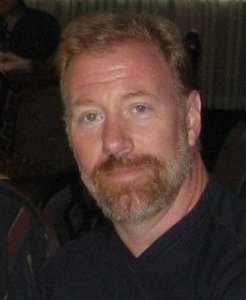
 Fred: I started out as a personal trainer for New York Sports Clubs way back in the mid-1980s. I was a Nautilus training fan then and the head of the fitness department there was also, so we got along really well. Around 1993 I became a certified personal trainer and was hired by the brand new Equinox Club in New York City. I also landed the job of physical therapy aide and personal trainer for the Hospital for Joint Diseases newly renovated sports medicine center. I was in charge of designing and implementing all the strengthening programs for the patients. After two years there, the head orthopedic surgeon was so impressed by how strong I was getting his patients he asked me to collaborate and we opened a new physical therapy company called MetroSportsmed inside New York Methodist hospital in Brooklyn, New York. I ran that clinic for three years.
Fred: I started out as a personal trainer for New York Sports Clubs way back in the mid-1980s. I was a Nautilus training fan then and the head of the fitness department there was also, so we got along really well. Around 1993 I became a certified personal trainer and was hired by the brand new Equinox Club in New York City. I also landed the job of physical therapy aide and personal trainer for the Hospital for Joint Diseases newly renovated sports medicine center. I was in charge of designing and implementing all the strengthening programs for the patients. After two years there, the head orthopedic surgeon was so impressed by how strong I was getting his patients he asked me to collaborate and we opened a new physical therapy company called MetroSportsmed inside New York Methodist hospital in Brooklyn, New York. I ran that clinic for three years.
After leaving the clinic, due to trouble with the physical therapists not wanting to embrace high-intensity training principles, I enrolled at Long Island University to complete my degree in athletic training and exercise physiology. But my wife became pregnant and I found a fantastic space to open my own gym less than a mile from my home, so I left school and founded Serious Strength. The name, by the way, was thought up by my father when I was training him after surgery due to liver cancer. He got off the Nautilus leg curl machine and said, “Son, I can see how this slow training will give you serious strength.” Serious Strength celebrated our fifteen-year anniversary this past June.
 Tom: You've been in the industry for over thirty years. You've seen all the popular diet and nutrition protocols come and go. Based on past experiences and diligent study, you now stand firm on your nutrition and strength training recommendations. Can you share those with us?
Tom: You've been in the industry for over thirty years. You've seen all the popular diet and nutrition protocols come and go. Based on past experiences and diligent study, you now stand firm on your nutrition and strength training recommendations. Can you share those with us?
Fred: The research on nutrition for health appears to favor a high fat, low carbohydrate, adequate protein diet that is based on real foods as opposed to manufactured foods. There are some manufactured foods that can be eaten (pickles, sauerkraut, etc.), but you want to eat mostly foods that have walked, crawled, flown, or swam or have grown out of the ground with little processing.
As for exercise, research supports resistance training as the main or central part of a person’s exercise program. In fact, if you strength train correctly and consistently, you really do not need to do any other formal type of exercises like Pilates or aerobics. And resistance training will make you better at any sport or activity that you enjoy.
 So this begs the question - since we need to strength train and since strength training provides all the benefits we require, how do you go about strength training? As I see it, it should be:
So this begs the question - since we need to strength train and since strength training provides all the benefits we require, how do you go about strength training? As I see it, it should be:
- Safe
- Time efficient
- Productive
I base my Slow Burn program on those three principles using the current science on the subject (plus a little experience) as a guide.
Tom: The low-carbohydrate approach. Why is this superior to other macronutrient breakdown recommendations?
Fred: Simply put, a low carb diet - or what I like to call a normal carb diet - allows your body to use stored body fat as its primary fuel source as opposed to dietary carbohydrates. This is why research always shows that people on low carb diet have low levels of blood fats (triglycerides). High triglycerides are a risk factor for cardiovascular disease. Randomized controlled trials indicate that keeping carbohydrates low, fat high, and protein adequate is the most healthful way to eat. This assumes you are eating real, non-manufactured foods, as many of these meats contain corn syrup solids and other hidden sugars.
Tom: In strength training, intensity of effort is required to stimulate muscle growth. Additionally, if you give it your all, there is no need to perform a high volume of work. Can you give a brief overview of the proven science that supports this point?
Fred: First, let me say that most studies on strength training are of a short duration. So it is true for advanced trainees that a higher level of volume might be required. I’m not suggesting five times the amount of volume I would suggest for the bodybuilder, mind you. But most people are not looking to become bodybuilders. In fact, in my 25 years of training people only a small fraction of clients wanted the most muscle possible. I’ve had people quit my program because they became too large!
What science does show, and what my experience tells me, is that a single set of an exercise taken to momentary muscle fatigue (or darn close to it) is sufficient to stimulate positive tissue remodeling (growth of muscle and bone). Henneman’s size principle of fiber recruitment supports this as well. There isn’t any theoretical reason to think that more volume beyond a certain point will build more muscle.
INTERESTING VIDEO












